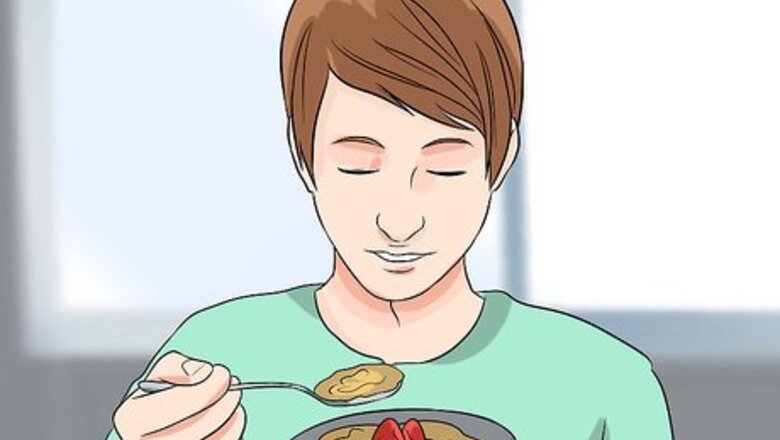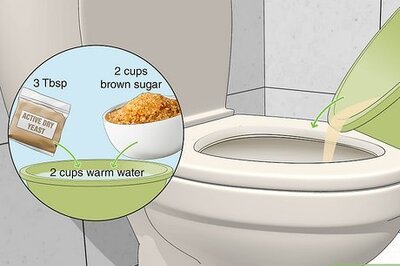
views
X
Research source
When food moves through your body, it passes through two sphincters that act as valves – one going into your stomach and one leaving it.[2]
X
Trustworthy Source
MedlinePlus
Collection of medical information sourced from the US National Library of Medicine
Go to source
Sometimes bile flows backward through these valves, resulting in symptoms like upper abdominal pain, heartburn, nausea, and even vomiting. These symptoms can be reduced by making changes to your diet, altering your lifestyle, and seeking treatment from your doctor.
Changing Your Diet

Eat soluble fiber foods with every meal. Foods with soluble fiber absorb liquids like bile as they move through your stomach and intestines. Every time you eat a meal, include foods like oat bran, barley, nuts, peas, beans, bananas, peaches, or apples. You may also want to include vegetables that contain soluble fiber, as they tend to be easier to digest. Some vegetables to try include: Summer and winter squash Carrots Yams, sweet potatoes, potatoes Turnips Parsnips Rutabagas Plantains Beets Yuca Taro

Limit fatty foods. High-fat foods speed up digestion, which works against those slow-moving soluble fiber foods that are trying to absorb excess bile. Cut out or limit fatty and processed foods like hamburgers, hotdogs, fried foods, milkshakes, ice cream, and anything that has a rich sauce on it. Stick to lean meats and healthy fats like avocados, nuts, and Greek yogurt.

Eat five or six small meals a day. Smaller meals put less pressure on your pyloric valve (sphincter between bottom of stomach and top of small intestine) than large, heavy meals. Change your eating schedule so that you're having five or six small meals each day rather than three large ones. Try dividing your normal portions in half, and saving one half for a couple of hours later. It is also important to chew your food well, drink something non-carbonated with your meals, and go for a walk or sit upright for 2 hours following your meal. Don't lay down right after you eat.

Drink non-alcoholic beverages. Alcohol can contribute to bile reflux because it relaxes the lower esophageal sphincter, which allows bile and gastric content to move backward into your esophagus. Cut out as much alcohol as possible from your diet, and replace it with water or non-citrus juices like carrot juice, or a freshly squeezed juice made from cucumbers, beets, spinach, watermelon, or pears.

Cut down on coffee and caffeinated tea. Both coffee and some types of tea (caffeinated) relax your lower esophageal sphincter muscles, allowing for more bile reflux. If you can't cut out coffee or tea entirely, limit yourself to one cup a day. Caffeine may affect the lower esophageal sphincter, so opt for decaf coffee or tea. Some tea options that will not relax the sphincter include chamomile, licorice, slippery elm, and marshmallow. These teas may help to soothe GERD symptoms. Avoid peppermint tea because it can relax the lower esophageal sphincter.
Altering Your Lifestyle

Stop smoking. Smoking increases the acid in your stomach, which leads to more discomfort from bile. Research methods to quit smoking, join a support group, and ask for advice from your doctor. You can also try nicotine replacement therapies like patches, gums, or lozenges.

Lose excess weight. Bile reflux is more common if you have extra pressure on your stomach, such as from excess weight. Use a BMI calculator online or talk to your doctor to find out what a healthy weight is for you. Then start a diet and exercise program to trim those extra pounds.

Stay upright after eating. Don't underestimate the power of gravity – keeping your body upright makes it harder for bile to move backwards through your digestive system. After you eat, wait two or three hours before lying down or reclining.

Raise the angle of your bed. Sleeping at an angle can help reduce the symptoms of bile reflux. Aim for the placement of your upper body to be about 4 to 6 inches (10 to 15 cm) above your lower body. Raise the head of your bed with blocks or try sleeping on a foam wedge.

Practice meditation and other stress-relief activities. Stress can increase the amount of bile acid in your stomach, so find ways every day to reduce your stress levels. Try meditation to help you relax, either by yourself or with others in a meditation class. Other stress-relief activities include reading in a quiet room for an hour, going for a walk outside, or performing some light exercise like jogging or dancing for 20 to 30 minutes.

Keep a food diary. Recording everything you eat and drink can help you to identify what may be causing the problem for you. Write down everything you eat and drink along with the time and any symptoms you experience after eating or drinking. Then, look back over your log at the end of each week to check for patterns. For example, if you notice that you have issues an hour or two after having a glass of orange juice, then this could be one of your triggers. Try avoiding orange juice for a week and see if that helps.
Seeking Medical Treatment

Call your doctor if symptoms persist. If you've tried home remedies and nothing is helping, call your doctor to set up an appointment. Bile acid is not just uncomfortable, it can also damage your esophageal skin cells over time, so it's important to seek treatment if you're not seeing any improvement.

Make a list of questions to ask at the appointment. Write down a list of questions you'd like to ask your doctor at the appointment so you don't forget anything while you're there. Ask about other diet or lifestyle changes you may not have considered, what treatment options they recommend, and what some possible side effects of those treatments could be.

Write down any medications you're taking. Make a list of all the medications and supplements you're currently taking so you can share them with your doctor. Include dosages and how long you've been taking them. Also write down medications, supplements, or treatments you may have taken to try to reduce bile that were unsuccessful.

Undergo testing if your doctor recommends it. Your doctor may want to perform one or more tests to check for inflammation in your esophagus. This could involve an endoscope or a probe passing through your nose or down your throat. Your doctor may also want to use esophageal pH monitoring. For this test, a tube is passed down through your nose or mouth and into your stomach. Then, the tube is pulled into your esophagus. It is attached to a monitor that will monitor how much acid is in your esophagus. You wear the monitor for 24 hours and record any symptoms that you have as well as your activity during that time. Then, the tube is removed and the monitor information will be compared to your log of symptoms and activity.

Take medication prescribed by your doctor. Your doctor may recommend medication to help promote bile flow, or a proton pump inhibitor, which can lessen the symptoms of bile reflux, but will not block bile production. In extreme cases where medicine is ineffective, surgery may be necessary. Be sure to discuss the pros and cons of all of these treatment options with your doctor. Although the benefit has been modest, consider asking your doctor about prokinetics. They may help by increasing stomach motility and accelerating gastric emptying. They can also help to reduce bile reflux. While your level of stomach acid generally declines with age, the frequency of heartburn and reflux increases with age. Decreased acid levels may lead to gastritis and impaired gut motility.




















Comments
0 comment